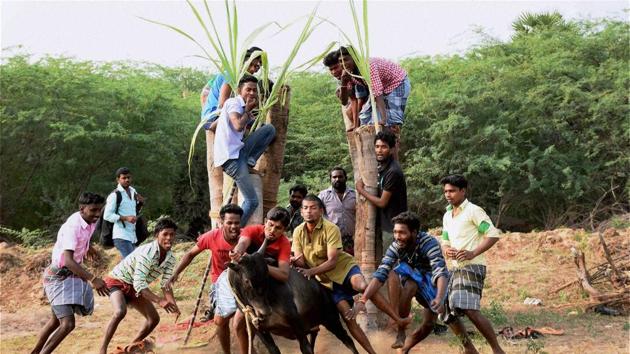Jallikattu matters: It’s a symbol of self-assertion, people power in Tamil Nadu
The current row over the sport, which began over the Supreme Court ordering a ban on the games over animal cruelty, has sharply divided opinions in the state.
Ever locked eyes with the Kangayam bull? Nudging the bustling commercial and export districts of Tirupur and Erode is Kangayam, whose eponymous bulls are prized champions among other sporting breeds, and are the talking point across India over Jallikattu.

The Kangayam bull, immortalised in popular iconography by Rajinikanth in the movie Murattu Kalai (The Rogue Bull), is a handsome fellow. His eyes maintain a proud look, his hump and hind curve like the ripple of a ribbon and he makes an arresting picture when he stands in the midst of a ploughed field, clearly lord of what he surveys. Unlike the Haryanvi bull which carries menace in its gait, the Kangayam bull is a sport, ready for game, and a beast that is not quite a brute. He’s doughty and strong, capable of withstanding drought and hard labour. Trussed up and garlanded he is the star of all Pongal celebrations.
It is not surprising that these bovines are an inspiration for the paintings of Tamil artist AV Ilango, who hails from the neighbouring district near Kangayam and his work is an ode to his rural roots.
With time farming practices have adopted mechanisation and transportation, even in drought marked regions in Tamil Nadu. Yet the bulls have their place in agrarian order, in little traditions and village customs and in rural sports like jallikattu. The rules of this all-male sport once asked for the participant to hang on to the hump of a running bull for a minute to be rewarded with sporting glory. It brought with it gladiatorial aspects of betting and buffing the participant’s masculine profile as a qualifier in the marriage market. It also kept rural entertainment and cultural traditions alive, away from the national and international spotlight like other sports like equestrianism that enjoy royal sanction and elite participants. Like the Brahman bulls that hoofed their way from India to America in the early 20th century and are now held up for their superior breeding and meat, the bulls of Tamil Nadu are healthy breeders too.
The current row over Jallikattu, which began over the Supreme Court ordering a ban on the games over animal cruelty, has sharply divided opinions. Times have changed, rules have slackened and inhumanity crept in. Feminists attack the outdated masculinity that comes with the sport; animal rights activists want to end the cruelty to the bulls by some participants who want to up the excitement with rural sponsorships demanding higher championships stakes; Dalit activists have called out the sport, played out in Madurai and its neighbouring regions, as it showcases the Thevar caste muscle; political watchers have pointed out that the current Thevar political stronghold of Tamil Nadu’s leadership is showcasing its strength with versus Prime Minister Modi whose posters has been defaced by protestors in Madurai and on the Marina.
The spontaneous student mass protests at the Marina, the voices from other Tamil sporting champions, AR Rahman, and the Tamil movie stars is an assertion of the cultural pride of a people often accused of regional chauvinism. On ground and across social media is the same irritation amongst the protestors from the provinces and Tamil techies across the seas that the Jallikattu row is seen as a regional sport with ethnic quirks by the rest of India, the same way they find the state’s politics and movies as Tamil cultural oddities.
What seems more sensible is to bring strict regulatory practices into the sport that will disqualify participants when checked for substances or cruel behavior. Like the other contact sport of Tamil Nadu, kabbadi that got fancy with the backing of Bollywood stars, the Tamil movie stars who went on protest on 20 January, can come forward to buy teams. Rural sports will benefit from patrons from business houses of the state who can sponsor the games and ensure strict rules for keeping beast and man on a sporting keel.
For a state recently beleaguered over the loss of its leader and a shake-up in the political leadership, a state that came together with humanism over natural calamity, Jallikattu has turned into a symbol of self-assertion and people power.
Jallikattu is unacceptable: Argument that it’s Tamil culture doesn’t hold up
The repeated neglect of Tamil identity is the rallying point for Jallikattu protests
(The author worked as a journalist from Chennai and is now senior commissioning editor Lonely Planet, Delhi. The views expressed are personal.)





